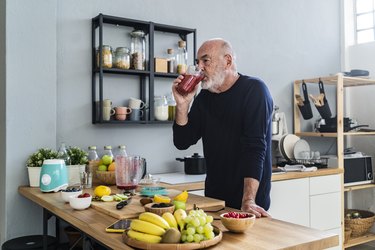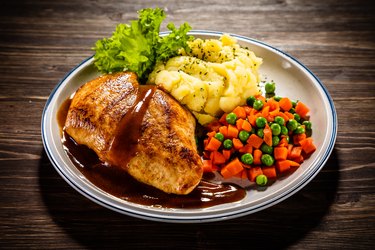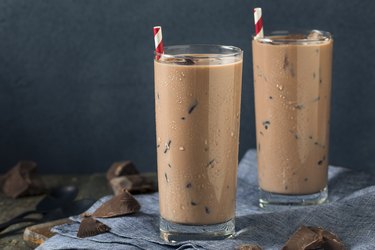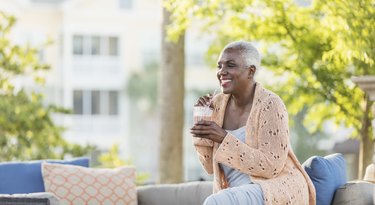
Maintaining a healthy weight is important at every stage of life. But it can be a little more difficult as an older adult due to the physiological changes that occur as you age.
Older adults often struggle to get enough calories and protein, which puts them at risk for weight loss and low body weight. Too-low body weight can have a negative effect on your strength, energy levels and quality of life.
Video of the Day
Video of the Day
In order to gain weight as an older adult, you'll need to eat nutrient-dense foods, snacks and drinks, and possibly add weight-gain supplements to what you already eat.
Here, learn why older adults may lose too much weight along with the best weight-gain drinks and foods to help the scale go up.
Why It Can Be Difficult for Older Adults to Gain Weight
There are several reasons why it's harder for older adults to gain weight, or why they lose weight so easily.
As you age, your appetite decreases, and you tend to eat fewer calories than younger people. In fact, caloric intake has the potential to decline by as much as 500 to 700 calories per day in older adults between the ages of 60 and 74 compared to adults ages 20 to 39, per a January 2016 meta-analysis in Nutrients.
There are a few factors that can affect an older adult's appetite and weight. Chronic diseases and appetite-suppressing medications (both more common in older people) can lead to a reduced appetite, per Mount Sinai.
And in some cases, dental problems can make it difficult to chew or swallow food, leading to less food intake, according to a June 2015 study in the Journal of Epidemiology.
Other factors that can contribute to unintentional weight loss in older adults include the following, per the Mayo Clinic:
- Depression
- Dementia (or memory loss and cognitive decline)
- A change in taste and smell
- Infection
- Certain medications
- Underlying illness (like heart disease or Parkinson's disease)
Ultimately, the human body is constantly evolving, and age-related changes can greatly influence nutrition requirements and appetite, per Harvard Health Publishing.
5 Tips to Increase Appetite and Weight Gain in Older Adults
If you or a loved one is experiencing unintentional weight loss and/or a reduced appetite with age, there are a few actions you can take. These include:
1. Contact Your Doctor
To get to the bottom of your weight loss, it may be helpful to get a doctor involved, per the Mayo Clinic. They can diagnose any potential underlying health conditions and treat them properly.
Your doctor may also help adjust your diet or switch your medications if that is causing reduced appetite. And if dental issues are the problem, a trip to the dentist could resolve discomfort or chewing problems.
2. Stick to a Mealtime Schedule
One way to increase appetite and assist in weight gain is sticking with a mealtime schedule every day, per the National Institute on Aging. This can be achieved through meal prepping your own food, having a loved one help you or taking advantage of pre-made meals or local community centers that serve meals.
You can also try to eat multiple smaller meals during the day to stimulate appetite, rather than sitting down to three big meals, per the Mayo Clinic. This can also help you get more calories overall.
3. Engage in Light Exercise
Light to moderate exercise is a great way to increase appetite in older adults. Even something like taking a walk around the neighborhood each day can help.
By burning calories and stretching muscles through light exercise (think: walking or yoga), you're more likely to have an appetite throughout the day, according to Michigan State University.
Over time, you could even engage in a well-rounded strength training program to enable the growth of muscle, which can lead to healthy weight gain, per the Cleveland Clinic.
4. Make Meals Look (and Taste) Appetizing
As mentioned above, it may help to keep portions small so they look easier to eat. With the approval of a doctor, you can also add spices and seasonings to food to make it more appealing.
Try adding new and nutritious toppings to your favorite foods, too, and introduce tempting side dishes, like cheesy mashed potatoes next to a plate of broccoli and lean beef, for example.
5. Ask About an Appetite Stimulant or Over-the-Counter Weight-Gain Supplement
If none of the above tactics work, ask your doctor about taking a prescription appetite stimulant. They may also recommend over-the-counter weight-gain supplements, food or drinks (more on that below).
A registered dietitian can also provide individualized counseling based on your weight-gain goals.
Calorie-Dense Foods for Weight Gain

If you're an older adult who needs to gain weight but you aren't getting enough calories, you can add calories to your diet through nutritious snacking and small changes to meals.
The Academy of Nutrition and Dietetics recommends focusing on nutrient-packed foods from all major food groups. Indeed, as far as types of food to increase appetite, you'll want to focus on the following, per the Cleveland Clinic:
- Protein-rich meats like chicken breast, ground turkey, lean pork chops, salmon and lean beef
- Full-fat dairy products, such as yogurt, cheese, milk and cottage cheese
- Complex carbohydrates like beans, peas, squash, potatoes, bulgur, farro, lentils, quinoa, brown rice and whole-grain bread
- Protein-packed supplements such as protein powder and nutritional shakes (more on these below)
You can also add healthy, calorie-rich extras to the foods you already enjoy to help increase your calorie intake:
- Top sides like a hearty salad with nuts, freshly grated cheese, sliced avocado and dried fruit
- Make full-fat versions of your favorite dishes, i.e., using butter instead of margarine, cream instead of low-fat milk, etc.
- Eat hearty snacks like whole-grain crackers with cheese or peanut butter
- Try snacking on small portions of unsalted nuts
- Eat full-fat yogurt or dairy products with fruit toppings
- Add toppings to popcorn, like shredded cheese
High-Calorie Beverages for Weight Gain

Incorporating high-calorie beverages into a daily routine can help older adults gain weight, too. The best weight-gain drinks will include:
- Whole milk
- Chocolate milk
- High-protein smoothies
- 100 percent juice
For example, if you drink 8 ounces of whole milk (about 146 calories) or chocolate milk (about 211 calories) at each meal, you'd add an extra 438 to 633 calories per day, per the USDA.
Similarly, 8 ounces of orange juice will provide an extra 112 calories per meal, or about 336 calories per day, per the USDA.
And if you make a smoothie with protein powder, whole milk and yogurt, you can add up to 500 extra calories per day, depending on the type of protein you use and the other smoothie ingredients.
High-Calorie Supplements for Weight Gain

If nutrient-dense foods and drinks are not enough, you can add over-the-counter nutritional supplements in the form of high-calorie shakes or powders to help promote weight gain.
Most popular weight-gain supplements are available at grocery stores and pharmacies. You can take them between meals or in addition to meals if you're caloric intake is too low.
Some brands of weight-gain shakes to try include:
- Ensure and Ensure Plus: 220 to 350 calories per can, respectively
- Carnation Instant Breakfast: 220 calories per bottle
- Boost: Up to 530 calories per carton
There are also nutritional supplements made specifically for older adults with underlying health conditions, including:
- Glucerna Snack Shake: This is a supplement designed for people with diabetes, providing additional calories while maintaining blood sugar levels; it has about 140 calories per can
- Nepro: This is a high-calorie supplement low in potassium and phosphorus, for people with kidney failure; it has about 420 calories per can
If you're unsure about the right type of nutrient supplementation for you, talk to your doctor and/or a registered dietitian with experience working with older adults. They may be able to suggest alternate nutritional supplements if the above shakes and powders are not right for you.
The Bottom Line
There are many different reasons why older adults have difficulty gaining weight or lose too much weight as they age. This can include depression, cognitive decline, medications or reduced appetite.
Thankfully, there are ways to increase appetite, and high-calorie foods and drinks you can try to help you gain weight. If you're having trouble gaining weight or believe you have an underlying health condition causing low body weight, talk to your doctor.
- Nutrients: "Ageing Is Associated with Decreases in Appetite and Energy Intake—A Meta-Analysis in Healthy Adults"
- Mount Sinai: "Appetite - decreased"
- The Journal of Epidemiology: "Poor Oral Health and Diet in Relation to Weight Loss, Stable Underweight, and Obesity in Community-Dwelling Older Adults: A Cross-Sectional Study From the JAGES 2010 Project"
- Mayo Clinic: "Mayo Clinic Q and A: Weight loss in older adults can signal underlying health issue"
- Harvard Health Publishing: "Healthy Eating for Older Adults"
- National Institute on Aging: "Healthy Meal Planning: Tips for Older Adults"
- Cleveland Clinic: "High-Calorie Foods and Snack Ideas to Gain Weight"
- Michigan State University: "Decreasing and increasing appetite through exercise"
- Cleveland Clinic: "I Just Started Exercising — Why Am I Gaining Weight?"
- USDA: "Whole Milk"
- USDA: "Chocolate Milk"
- USDA: "Orange juice, raw"
- Mayo Clinic: "No appetite? How to get nutrition during cancer treatment"
- The Academy of Nutrition and Dietetics: "Healthy Weight Gain"
- Ensure: Nutrition in Charge
- Carnation Instant Breakfast: Breakfast Essentials
- 6. Best Practice Advocacy Centre: Strategies to Improve Nutrition in Elderly People
- Glucerna: Helping People with Diabetes Find Balance
- Nepro: Therapeutic Nutrition for People on Dialysis
Is this an emergency? If you are experiencing serious medical symptoms, please see the National Library of Medicine’s list of signs you need emergency medical attention or call 911.